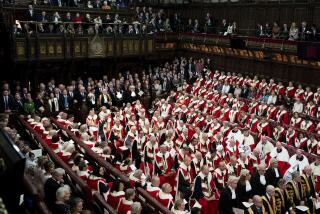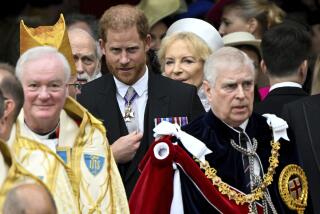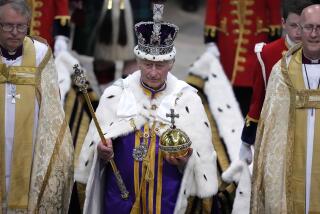Andrew Bows to His Peer Group
- Share via
Prince Andrew took his seat in the British House of Lords in an elaborate ritual of bowing and hat-doffing that has endured for 365 years. Wearing the traditional scarlet and ermine robes borrowed for the occasion, the Duke of York marched into the ornate chamber and recited his allegiance to his mother, Queen Elizabeth, then bowed and tipped his hat three times to Lord Hailsham, the bewigged Lord Chancellor who presides over the House while seated on the traditional woolsack, a large red cushion stuffed with wool from several Commonwealth countries. The 15-minute ceremony ended with a harrumph of “Hear, hear” from the more than 400 peers who packed the upper house of Parliament. Andrew, 26, became a duke--as well as the Earl of Inverness and Baron Killyleagh--in honor of his marriage last July to the former Sarah Ferguson, now the Duchess of York. Although the House of Lords has the power to amend legislation passed up from the House of Commons, it is often ridiculed because some members habitually snooze during sessions or ramble on about such obscure subjects as grouse-shooting. Andrew, like most members of the British royal family, is unlikely to take an active part in its proceedings.
--Call it a sign of the times. When students at Shawnee Mission East High School in Prairie Village, Kan., decided to groove on peace, love and vegetables for “Hippie Day,” they got their symbols mixed up, confusing the peace symbol with the Mercedes-Benz logo. “I guess we were kind of ignorant about that,” said a sheepish Beth Jennings, 17, one of the sign painters. English teacher Bill Boley, noting that the school draws many of its students from affluent areas of suburban Kansas City, said the sign was discreetly fixed after the mistake was discovered.
--Dr. Royal Ellwood Durham, 92, a resident of a Linwood, N.J., nursing home, finally got his marching orders. He just received formal notice from President Woodrow Wilson of his assignment for Army duty during World War I. The musty paper cylinder containing a medical certificate and the notice of his appointment as a first lieutenant in the medical section of the Army’s Officer Reserve Corps bore a 1917 postmark. It arrived mysteriously Feb. 4 at Episcopal Hospital in Philadelphia, where Durham worked briefly before the war. The package simply “turned up on our loading dock,” said hospital spokesman Anthony Cirillo, who added that the post office said it had not delivered it. Durham, a lifelong bachelor who moved to New Jersey to practice medicine after his Army stint, was amused by the unexpected arrival. “I knew I should have gotten it,” he said. “I just didn’t know what happened to it.”
More to Read
Sign up for Essential California
The most important California stories and recommendations in your inbox every morning.
You may occasionally receive promotional content from the Los Angeles Times.













